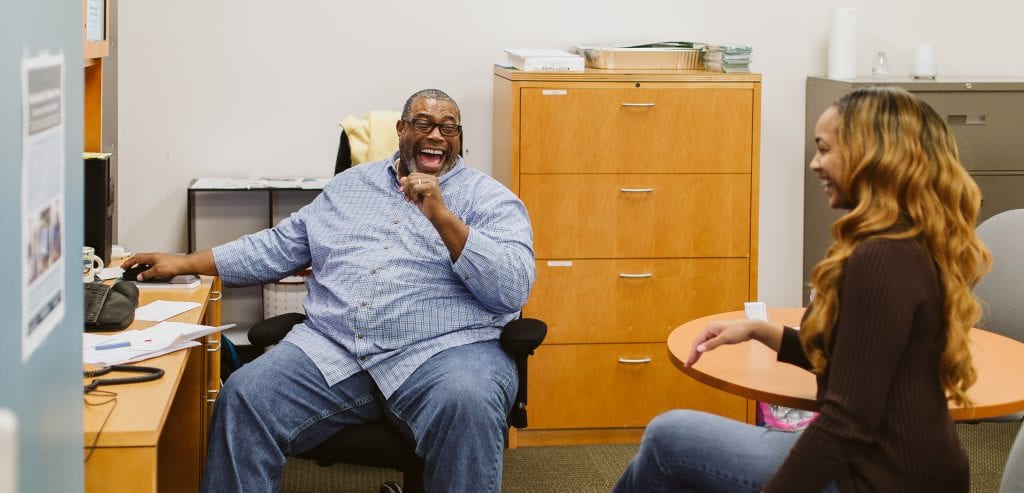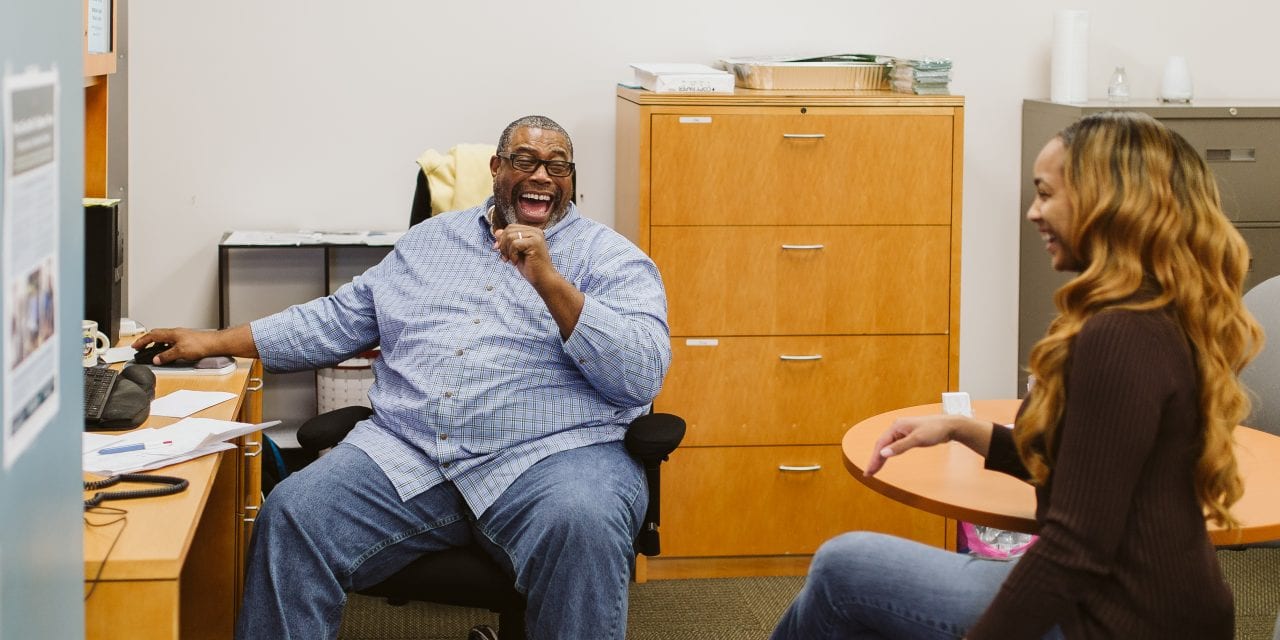The age-old question of “What do you want to do with your life?” may be crippling to some. For younger people not yet in the workforce, they may not have had enough life experience to know that certain jobs even exist. For older people, their life experiences may not have granted them the ability to see what other paths they might have taken. Bypassing age altogether, socio-economic factors can slam doors closed for many people who want more out of their lives.
The Nashville Area Chamber of Commerce (Nashville Chamber) demonstrates that a chamber of commerce can do more than help businesses meet a profit goal. It can assist people who are trying to start careers in different sectors of the workforce. Vice President of Talent Development Laura Ward has been with the Nashville Chamber since 2016. She works in a couple of different areas, including helping employers “upskill” and “reskill” their current workforce. In addition, she works with the Nashville Talent Hub, which she says is focused on residents of the 46-square mile area known as the Nashville Promise Zone. Per the Housing and Urban Development (HUD) website, the area has a population of 121,470, a poverty rate of 37.61 percent, and an unemployment rate of 14.08 percent.

According to the city’s official website, the Nashville Promise Zone’s mission “is to foster intensive partnerships among Nashville’s organizations that serve high-poverty neighborhoods, improve the collective impact of their service, and address revitalization in a collaborative way.” Ward says that there are large equity gaps in the Nashville Promise Zone. She says that residents of the Promise Zone receive support and wraparound resources to acquire a degree or complete credentialing for more better quality jobs.
Laura also does a fair amount of work with policies. She is the administrator of a couple of grants awarded through the National Skills Coalition. These grants were given specifically to build out both employer and provider coalitions to remove the red tape keeping people away from their desired jobs or education. She tells Launch Engine, “My position is in workforce development, but I work both with employers and with people who need to earn a credential or degree.”
Laura’s workload in workforce development is split with Nashville Chamber’s Vice President of Education Initiatives Samantha Perez, who moved to Nashville in 2010 to pursue her Ph. D. in Sociology. She decided that academia wouldn’t let her be as hands-on with the community as she wanted to be. After working with the Metro Human Relations Commission for a few years to promote equity, diversity, and inclusion, she got involved in education through the collective impact group Alignment Nashville. Since Alignment Nashville’s goals were similar to those of the Nashville Chamber, Samantha relocated to the Nashville Chamber after learning about a job opportunity with the organization.
Now, as part of Laura’s team to help with workforce development, she serves in the 12P-16P education range (high school graduation and beyond). Samantha says that her work relates to Metro Nashville Public Schools (MNPS) through the Academies of Nashville, which are wall-to-wall academies focused on career development in the city’s 12 zoned high schools. By way of community partners, the Academies of Nashville provides MNPS students with much-needed field trips and chances to job-shadow as a way of exploring potential future careers. This type of experiential learning wouldn’t otherwise be on the table for those enrolled in MNPS.
Laura explains that both she and Samantha “work in a systems-change way.” By effecting change at the organizational level, the Nashville Chamber can shine a spotlight on workforce issues for those young adults starting their careers. The “policy-first” methodology can also help get the most out of available resources and yield better results by successfully placing future professionals with long-term vocations.

“The real core of the Chamber’s work is in systems transformation,” Laura says. “There’s a reason that there are inequities in our community. And many of those are the result of systems that need to be redesigned.”
Per Laura, much of the workforce efforts go to collaborative impact work. She says that since “resources are finite,” the transformation of systems produces greater results. In this case, Laura states that the transformation that is needed is “an educated workforce that is more agile and ready to meet the needs of employers who are already in our region and are moving to our region.”
She says, “So I think that for our workforce work, it’s often to serve as a convener or a backbone organization for these types of efforts. Because we’re a neutral convener; we don’t have… skin in the game of education or employment. We can be a neutral convener and sort of convene that table among many different groups.” As an objective entity, the Nashville Chamber can move freely to facilitate changes and work with other organizations who might have a particular mission or goal for the area. The Nashville Chamber can also align and coordinate available resources in a way other groups could not.
Of the talent pool that the Nashville Chamber is building, Samantha says, “There’s an appetite right now… we have businesses that want to contribute [in ways] that are much more meaningful than, ‘I’m gonna write you a check.’ They want to be involved in solving some of their challenges too. When I think about the Academies, their business partners are coming in, and they’re future-oriented. So, they’re thinking about what their future talent and workforce looks like, and want to be part of fostering that as well.”
Samantha says that part of the job she and Laura have is to help area businesses see the benefits of investing in a future workforce. “Some of this may be harder and more challenging work,” she explains. “Systems change is not quick. It doesn’t happen rapidly. But it makes a bigger impact down the road. And you may not see the fruits of that labor right away; the way that you would if you wrote a check or provided a grant, and expected to see outcomes in, you know, three to five years. If you’re really committed to addressing inequity, then you’ve got to be committed for the long road.”
Laura says that Nashville has been named a “Talent Hub” by the Lumina Foundation since 2017, and that the Nashville Chamber works across the distinct populations of opportunity youth, adult education, and adults who are seeking education beyond high school (P-12 and P-16).
As the backbone organization for the Nashville Talent Hub, the Nashville Chamber’s educational focus is offered through the Nashville Reconnect and Tennessee Reconnect programs. Using the Tennessee Reconnect grants, they can up-skill residents. Laura says, “What we really are trying to do is create a community. Not just a place, but a community…So, no matter where you go, you can get the help you need.”
Laura says that the current operation for many community resources trying to place workers is that if a person doesn’t qualify for what the resource provides for job placement aid, then that individual is turned away and not assisted by the system. What the Nashville Chamber is trying to provide is a mechanism that protects people from falling through the cracks in the system, so that they can get the vocational help they need. For instance, if one went to the American Job Center to get help with employment, the American Job Center would also connect that individual to other resources for help.

It’s important to point out that a person’s needs to upskill or reskill can come at a moment’s notice. Laura explains that if a manufacturing facility were closing or laying off employees, then reskilling people might be able to keep that individual in a similar line of work. She stresses that this depends on the location of the hypothetical employee, as workers in rural locations might be limited as to their employment options. In larger areas like Davidson County, there are assessments offered by groups like the Nashville Chamber that allow workers to determine their compatibility for other jobs.
“Some decisions have to be based on availability,” Laura says. “Other decisions, where you have a broader employment pool, can be based more on aptitude.” She offers that, in her hypothetical example, if a company was laying off personnel, that they would first have to notify the Department of Labor. This typically prompts a visit from staff members of the American Job Center to help those in need of another job. This is all part of the broader functions of the Workforce Innovation and Opportunity Act (WIOA). When it comes to relocating up-skilled or reskilled workers, the Nashville Chamber isn’t so much looking at individual jobs (since those fluctuate) but at sectors like Information Technology, Health and Patient Care, Construction Maintenance, and Advanced Manufacturing.
Kind of like the axiom “prevention is the best medicine,” the Nashville Chamber is also working in advance to make sure that the workforce’s needs are met. Samantha says that the Nashville Chamber wants to set the foundation for success early on for particular career pathways.
She says, “The Academies’ model is such that students are able to self-select into a pathway of interest based on five different industry sectors… We provide the foundation for students to take those career and technical education courses, so that students are getting exposed to that field starting in the 10th grade.” Samantha states that, in addition to the field trips and job-shadowing programs, there are also internships and scholarships available for MNPS students. The Nashville Chamber has worked more closely in the past couple of years with MNPS and Nashville State Community College to provide early postsecondary credentialing opportunities for students.
The district has taken on the cost of things like industry certifications for students who want to study for those exams, so that financial limitations won’t be a barrier. Per Samantha, research shows that students who take advantage of early post-secondary opportunities are more likely to complete their post-secondary credentials or degree. What’s more, parents of the Academies of Nashville students wanted their children to be familiar with different types of jobs early on by meeting people experienced in those particular fields. “For some of our students…” Samantha says, “If you can’t see it, you can’t be it.”
Those interested in sharing their career wisdom with tomorrow’s workforce are encouraged to reach out to the Nashville Chamber. For further information about the Nashville Area Chamber of Commerce, including information about their education initiatives, be sure to visit their website and social media.








